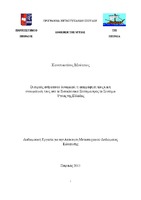Οι εκροές ανθρώπινου δυναμικού, η απορρόφηση τους και η ενσωμάτωση τους από το εκπαιδευτικό σύστημα προς το σύστημα υγείας της Ελλάδας

Master Thesis
Συγγραφέας
Μούτσιος, Κωνσταντίνος
Ημερομηνία
2015-03-11Επιβλέπων
Σακελλαρόπουλος, ΘεόδωροςΠροβολή/
Θεματική επικεφαλίδα
Εθνικό Σύστημα Υγείας (Ελλάδα) ; Ιατροί ; Ιατρικό προσωπικό ; Νοσηλευτές -- Υγεία και υγιεινή ; Οδοντίατροι ; ΦαρμακοποιοίΠερίληψη
Η παρούσα μελέτη στοχεύει μέσα από βιβλιογραφική έρευνα να συγκεντρώσει τα στοιχεία εκείνα που θα δώσουν στον αναγνώστη της μια αδρή αλλά ολοκληρωμένη πρώτη εικόνα για τις εκροές ανθρώπινου δυναμικού από το σύστημα εκπαίδευσης προς το σύστημα υγείας της Ελλάδας καθώς και για την απορρόφηση τους από αυτό. Στοχεύει λοιπόν να δώσει σε έναν ερευνητή τις βάσεις για την ενασχόληση του με το ανθρώπινο δυναμικό της υγείας στην Ελλάδα και τις βιβλιογραφικές αναφορές για την συνέχιση και περαιτέρω εξειδίκευση της έρευνας του. Το πρώτο κεφάλαιο αποτελείται από δύο μέρη. Στο πρώτο από αυτά γίνεται μια σύντομη αναφορά στο εκπαιδευτικό σύστημα, τη δομή του και το σύνολο των προσφερόμενων υπηρεσιών του, στον τρόπο λειτουργίας του αλλά και στη διάρθρωση του. Ενώ στο δεύτερο παρουσιάζονται οι υπηρεσίες υγείας που παρέχονται από τον δημόσιο και τον ιδιωτικό τομέα της υγείας στην Ελλάδα σε επίπεδο πρωτοβάθμιας, δευτεροβάθμιας και τριτοβάθμιας περίθαλψης. Αναφέρονται οι οργανισμοί που παρέχουν αυτές τις υπηρεσίες καθώς και οι τρόποι για να λάβει ο πολίτης τις υπηρεσίες αυτές. Στο δεύτερο κεφάλαιο η μελέτη ασχολείται με την εκπαίδευση των επαγγελματιών υγείας. Παρατίθενται αναλυτικά στοιχεία για τη Σχολή Επιστημών Υγείας και την Σχολή Επαγγελμάτων Υγείας & Πρόνοιας. Γίνεται παρουσίαση των στοιχείων που αφορούν τον αριθμό φοιτητών και πτυχιούχων για τις σχολές Ιατρικής, Φαρμακευτικής, Οδοντιατρικής, Νοσηλευτικής και τα τμήματα Νοσηλευτικής, Μαιευτικής, Φυσικοθεραπείας, Διοίκησης Μονάδων Υγείας & Πρόνοιας. Αναλύονται οι ροές των σπουδαστών από αυτές τις σχολές διαχρονικά και γίνεται προσπάθεια για πρόβλεψη των μελλοντικών ροών. Παρουσιάζονται επίσης οι σπουδές που προσφέρονται από τον ιδιωτικό τομέα μέσω ΙΕΚ και ΚΕΣ αλλά και από δημόσια ΙΕΚ. Το τρίτο κεφάλαιο μας εισάγει στην εργασιακή πραγματικότητα των επαγγελματιών υγείας της χώρας. Αρχικά αναφέρονται κάποια γενικά στοιχεία για τα οικονομικά της υγείας στην Ελλάδα σε σύγκριση με τους μέσους όρους των χωρών του ΟΟΣΑ και αναλύεται η τεράστια σημασία του ανθρώπινου δυναμικού στη λειτουργία των συστημάτων υγείας αλλά και τα προβλήματα και οι δυσλειτουργίες που παρατηρούνται. Οι άνθρωποι που εργάζονται στο χώρο της υγείας είναι που δημιουργούν ένα αποτελεσματικό ή όχι σύστημα και αποτελούν το πιο δαπανηρό αλλά και το πιο σημαντικό του κομμάτι. Στη συνέχεια η μελέτη προχωρά σε αριθμητικά δεδομένα για το πλήθος ιατρών, οδοντιάτρων, νοσηλευτικού προσωπικού, φαρμακοποιών και φυσικοθεραπευτών καθώς και το γενικό σύνολο των εργαζομένων στην υγεία και την κοινωνική ασφάλιση και τα συγκρίνει με τα αντίστοιχα δεδομένα για τις χώρες του ΟΟΣΑ. Δίνεται μια λεπτομερής περιγραφή των συνθηκών της εργασιακής τους πραγματικότητας και παρατίθενται οι προβλέψεις για την εξέλιξη των επαγγελμάτων αυτών. Στο τέταρτο και τελευταίο κεφάλαιο της μελέτης προσπαθούμε να δώσουμε μια εικόνα των αμοιβών των επαγγελματιών της υγείας στο Ευρωπαϊκό περιβάλλον. Εστιάζοντας κυρίως στους ιατρούς (γενικούς-παθολόγους και ειδικούς, μισθωτούς και ελεύθερους επαγγελματίες) και στο νοσηλευτικό προσωπικό, παραθέτουμε αναλυτικά στοιχεία για τα εισοδήματα τους στο χρονικό διάστημα από το 2006 έως το 2011 και τα συγκρίνουμε με το μέσο εισόδημα κάθε χώρας αλλά και μεταξύ τους. Το κεφάλαιο κλείνει με ειδική αναφορά στην σημερινή ελληνική πραγματικότητα των αμοιβών στο χώρο της υγείας. Ακολουθούν στο κλείσιμο της εργασίας τα συμπεράσματα που προέκυψαν από την μελέτη της βιβλιογραφίας, στα οποία έχουν ενσωματωθεί και κάποιες προτάσεις του γράφοντος.


